#it has zero relevance to the plot but its important to me that hes trans
Text
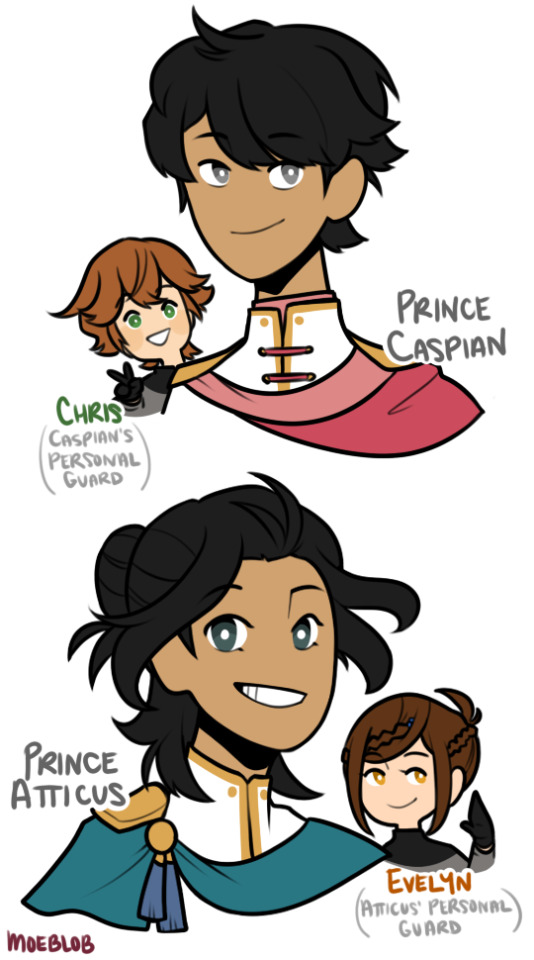
Today.............. has genuinely. Been. A Day.
Have some OC doodles I started yesterday before tragedy struck and are like the bare minimum effort for today to finish. Since the two princes were originally not /in canon/ for another plot but rather made for a mafia AU as cousins to one of the main characters for the base plot. I was like. Huh let's give them a happier life. So here they're just princes and instead of the police department/detectives that most of the main cast is in base plot, those are the royal guards around the twins' castle.
#my characters#the funny thing is that the princes are like......... made for an au of another plot#and here they are in another au of the plot#so like yeehaw everyone i love my ocs and i love putting them in situations#also idk what its worth but hey happy pride atticus is trans im proud of him#it has zero relevance to the plot but its important to me that hes trans#he also is like.... an absolute bundle of friendliness which is a huge contrast to the twins cousin#who is extremely stoic for the most part and finds it hard to feel emotions and thinks#everyone feels the same way all the time like him - WHICH IS DEPRESSED BY THE WAY#but he learns that ah nope thats just him and oh hes better by the power of love#and he doesnt actually get it ?? like in canon or mafia or as a prince hes just like#huh i like this guy and he makes me want to smile which is really odd im gonna stay by him if i can#and doesnt even realize right away hes fallen in love#atticus and caspian however are very aware of their emotions and are v happy to see their cousin feel things#and are constantly there to tease him but support him and help him and theyre all good boys#ill shut up in the tags now bc the tags are taking me as long to type as the art took to doodle
57 notes
·
View notes
Note
tell me about your ocs please!!! (/nf)
idk if u want my science fantasy multiverse thing or my silly transgenders because they are both cool but uh. you get silly transgenders
Lucas. Lin. Odin (presumed cishet). Noah. Madison (Madison isn't trans unless you're my ex. then shes whatever you want)
Lucas is silly. anxious 24/7 and kinda a dick about it. he means well i promise he's the main character and he's silly
Lin gets transphobically hate crimed every morning by Odin. he's great he's clinically depressed and he's SO fucking funny
Odin is our transphobic king and my personal fave. greasy and cishet (or is he). his dad is on the council but also his dad hates him
Noah. well. ADHD king. dead?!?!?! god is canon?!?!?! lying to his boyfriend (lucas)?!?!?!
Madison is the daughter of the mayor and lesbian icon she has autism swag and she's besties with Odin.
hijinks ensue. by that i mean there's a lot of arguments and odin physically assaults a guy (Lin) a lot . also noahs like a ghost which is technically a secret but its revealed in like chapter 15 and its not REALLY a shock. like yeah. the pale guy who knows approximately nothing and lies about his homelife. yeah .
also odin and madison are both insanely wealthy and there are some really funny interactions that come out of that. theres a spinoff where their dads fuck each other. its not relevant to the plot whatsoever.
also they all have parental issues in some shape or form. i think the best of them is madison (daddy's girl) and the worst of them. i mean in practice odin or lin but Noah's parents ARE why he's dead. but we never meet them (WHICH IS IMPORTANT TO THE NARRATIVE)
honestly Noah's themes and motifs are so fun. he's such a guy. he's so silly he's blond and he likes running and lin really hates him for zero reason.. a guy of all time
all in all the story is very. trying to find yourself/coming to terms with who you'll never be. the ending (as i have it planned atm) is bittersweet and unsatisfactory in the way life is. Noah didn't get to be who he was meant to be. At least he was loved.
Odin and Lin have a really interesting arc as well because on paper. they shouldn't work. but they do!!! and its awful and beautiful all at the same time!!! Odin's character arc is honestly my favourite he goes through a LOT of growth and honestly. he's just SO relatable at parts. what a guy.
i think it's all quite silly tbh. im currently on ch26 of my first draft and im very excited for when i finish it !!! they're my silliest guys :)))
thank u so much for asking please please please ask more if you're interested this has literally made my entire day !!! /nf
#oc posting#lin and odin#oc lore#ocs#lucasworld#technically its titled middle of the road but lucasworld is sillier
3 notes
·
View notes
Text
and if your life won’t wait: spoiler free 2022 update
hello dear readers. if ur here from my fic welcome. if u just follow my blog, sorry. also, go read my fic.
okay, a… lot has changed since i started this thing. moment of silence for all cis tua writers with unfinished works from before season 3. im literally a trans man and had no idea how to handle this. im also completely disconnected from the fandom and i have no idea how other people have been doing it lol. anyway.
in regards to my fic, season three changed three big things for me. 1). viktor 2). klaus’ reincarnation powers are more fleshed out and canonical 3). my perceptions of the characters
viktor’s whole deal is probably the most relevant, so ill start there. when i started this fic, i had absolutely zero idea that elliot page would come out as trans, and subsequently his character would change as well. so the first ~5 chapters make absolutely zero mention to him being trans. the way i saw it, going forward i had two options. control f and retrospectively make him both trans and transitioned (which i honestly think is not only a valid option but one that i lowkey wish id done, way fucking easier) or rework his planned story arc around gender identity.
look. i said it already. im trans. i was deeply attached to viktor BEFORE he came out. he’s my guy. i have to write a coming of age trans story for him, even if that means dead naming him for a few chapters while we get there. he’ll be okay. he’s fictional. he’s figuring it out. this is a story about learning to let your family be in your life in a meaningful way so you can actually be happy. in the context of the fic, he also just watched his brother die and come back to life, so he’s a little preoccupied. don’t worry though, if there’s one thing you can count on the hargreeves to do, it’s prioritize their own personal drama in the midst of extremely important things happening around them.
i don’t write shitty endings for trans people. he’s going to have his little moment where he triumphantly cuts his hair and wears a too big button down with all the confidence of a seventeen year old freshly off their meds. i love him. please trust me. ive made the decision that the story i want to tell involves him not figuring things out for a little while, but he will figure them out. worry not. i came up with an incredibly convoluted excuse to get him pamphlets from an lgbtq resource center. you’ll see.
as for klaus… keep in mind reading these first few chapters that i was working with the knowledge of the first two seasons. that’s the knowledge with which i built this worlds life and death system. season three didn’t change too much, except canonize klaus’ ability to come back to life, and confirm that reginald did know about this ability and tested it in him, aka killed him over and over again until he was satisfied, and then klaus repressed the whole thing. tua plays pretty fast and loose with ghost rules, so i pretty much ignore all that to do whatever the shit i want, but this was really important to the plot, so i had to make a decision about whether or not i was including it.
there’s a bit of a mystery element that comes in down the line pertaining to reginald’s role in the story, so i wont say too much, but i did want to address it! just know that yes, i do understand the worlds death rules, i promise. this fic’s premise is basically taking their dumb death rules and throwing them out the window so that i can tell a story about family bonding. however, im really proud of the direction the story ended up going in light of the new season, and im excited to share it with you.
the third thing is characterization. now, this could be its own post, so ill keep it brief, but to me season three proved a few very important things about the hargreeves. they’re mean as fuck, irredeemably stupid, and love each other almost as much as they love their own respective attachment issues. they are a mess. im fucking obsessed with them. they love each other, and are incapable of being normal about it. it’s perfect.
a few important things to note:
- ben is as much of an asshole as the rest of them! confirmed!!! he may have been the nicest of them, but they’re all terrible, he’s just a little less terrible! big win for the ben is a dick community (population: me and klaus)
- as kids, allison was nicer to viktor then anyone. allison was NICER. TO VIKTOR. THEN ANYONE. that is such a wonderful revelation to me. i always interpreted their relationship as more like allison was trying to make amends and knew she had to make amends with viktor specifically, but no! allison was nice to viktor!! nicer. then ANYONE. i could talk ab s3 allison for a million years. she might be a little irredeemable. but i love her. and this fic and every fic forever will be allison friendly
- mostly just a gentle reminder that i am not writing about bitter thirty year olds carrying around decades of trauma and horror. i am writing about fresh faced seventeen year olds who have never had a brother like, actually die, never spent years on the street or on the moon or completely alone or getting into fights or watching their brother slowly kill himself or being an a list celebrity. they have the potential to be those bitter assholes, they really do, but for now, they’re kids. i want to write kids. the world is so bad. i want to write a coming of age where kids having their family with them gives them a happy ending. this is what i want and i will not give this up for any reason.
thank you for reading, sorry it’s a monstrosity of a post <3
#i def used to have a tag where i talked ab this fic but i don’t remember it anymore so….#iylww#yeah that works. whatever
0 notes
Text
zukka hp au part 5
I’m so flattered people like this au. I didn’t think I’d be posting again so soon, but I had some more ideas last night. If you’d like to catch up:
part 1 part 2 part 3 part 4 part 5 part 6 part 7 part 8 part 9 part 10 part 11 part 12 part 13
If you would like to join the tag list
My brief, very long, not at all fleshed out plan based roughly on what year Sokka is in and other associated events:
First year
Sokka’s first year is boring
He meets Zuko, makes some friends in his house, probably a bunch of OCs
He finds the kitchens on day 2
Hogwarts just hires people who like to cook, who cares whether they’re magical beings or humans or whatever, there’s all sorts of really cool kitchen magic though
He’s always asking questions in class and you can tell why he’s a Ravenclaw
He wants to learn about everything
And once he knows how to do more than shoot a few sparks, he’s going to start inventing
He’s going to do some truly awesome things with transfiguration and potions
And I can’t wait for him to start arithmancy
Like let me tell you, Sokka is a genius, and he’s probably going to be the only one who understands magical theory
This just ended up being a rant about Sokka, so moving on
Second year
The fun starts
Katara and Aang are finally here
Sokka doesn’t know Aang is the avatar
I’m very tempted to have both Katara and Aang be in Hufflepuff
And they run into Sokka in the kitchens
He does a double take, like who is this boy with my sister??
But Aang’s a sweet kid
So Sokka is immediately like we’re bros now, I don’t make the rules
Iroh starts working at Hogwarts (sorry, I changed my mind from herbology) as the potions professor
He comes in on the train with Zuko who just got banished (I actually...might change the specifics)
Sokka doesn’t know what to make of that
Azula is also skulking around annoying Zuzu
But I think she secretly cares a bit and threatens anyone that looks at his scar wrong, because Zuko helped her a lot with some stuff
I think she’s going to be in the same year as Katara and Aang? I’m not sure
I have plans for Azula
I think Mai and Ty Lee are going to be in Zuko’s year, but closer to Azula
Mai and Zuko will date at some point
I think Mai will end up with Ty Lee
But she and Zuko had a short relationship
I think it was more expected of them by their families that they date
But they’re good friends now
I’m not doing this betraying and cheating and hurting other characters to find out who you are thing
Everyone is having wholesome relationships that just don’t work out
(Sidenote, I’m changing things, and characters might end up a bit OOC for atla, and I’m really sorry, but this is just wish fulfillment for me)
Anyway, there’s a plot to find the avatar
The mini gaang (toph isn’t here yet) learn the prophecy (still working on it)
Third year
They find out about Sokka and Katara’s mom
I don’t think Hakoda really knows what happened either. I don’t think he was in the country at the time
I also have some ideas for the water tribe/fire nation beef, but I just made the realization that if I spell everything out in these posts, what’s the point of writing for Ao3 XD
But spoilers, it’s going to be pretty angsty
But I like happy endings, so I may find a way to fix it
Ish
I have this whole idea that if Suki or the Kyoshi are also werewolves, they have really cool rituals to respect and honor the moon spirit and that allows them the ability to turn into wolves whenever they want and not just the full moon
So other people can also be born as werewolves, but different groups have different ways of being a werewolf
Also, I believe I said Zuko starts following Suki around thinking she’s the avatar
And then Sokka decides to fake being the avatar (I completely forgot when I said this would happen, so I’m assuming it’s this year or the next)
This is about when Sokka’s letters to Hakoda start going on about Zuko’s everything even more
Fourth year
Zuko (Zuko’s fifth year) witnesses something unspeakable
Sokka is kidnapped
Zuko saves Sokka
That’s all the detail I have on this XD
But the unspeakable thing and the kidnapping are going to be this year’s mystery
Zuko, the idiot, still thinks Sokka is the avatar at this point
Aang is like no
But doesn’t bother to say he is
So Zuko thinks Katara is the avatar for a hot sec
But has some nonsense logic that there’s no need to stop following Sokka, because if he or his sister are the avatar, of the two, Sokka’s more likely to give something away
Which okay, Zuko, not actually terrible reasoning, except Sokka’s been leading you around by the nose for ages
There’s none of this the avatar rotates which element they can use
Because that’s predictable
And half the fun is that Zuko is trying his best, but has zero clues
Fifth year
This is the big question
I’m not sure what to do with this year
I hope Sokka can start inventing
I want him to make some cool shit
There won’t be an equivalent of the DA as far as I can see :( I can’t figure out how I’d structure that
I think it would be really cool to see them all learning how to use their elemental magic though
Toph and Zuko don’t really need the help
Katara and Aang have always had to deal with all the crap going on, so they haven’t had much time for it
I’m wondering if I should bring in Paku
Aang has it rough, because air magic users are really rare now
So I think he might work with Iroh, because he’s studied other styles of magic extensively
Sixth year
I think Mai had to figure out she was bi
I truly think Zuko doesn’t have time for gender
For like five years, he’s like DO YOU KNOW WHO THE AVATAR IS and if you don’t, he’s already forgotten who you are
So my headcanon is that he’s pan and when he and Sokka eventually get together, Sokka doesn’t know anything about his orientation and just knows he dated Mai, so he’s like “are you cool with me being a dude? Sorry, I just know you’ve dated Mai, so just checking haha?”
And Zuko’s so done with all the random crap he’s dealt with that he’s like “wow, you have a dick? Congratulations”
But then realizes Sokka’s actually concerned and talks it out
Anyway, everyone’s leveled up now, we’re all masters at elemental and non-elemental magic (seriously, Sokka could’ve sat for his NEWTs last year if he wanted to. He’s that far ahead and magic is that intuitive for him)
I have no idea what will happen this year lol
I kind of want an invasion of Hogwarts, I know I’ve been trying not to just blindly follow the books completely :/ So I guess we’ll see?
I’ll have to work on that
I’m such a sucker for the villain waits until the end of the school year to attack
Because it’s so dumb
Like I will find the avatar! *shakes fist* But education is important, kids
Like okay, Sozin
Maybe I can have Roku finally escape that mirror
I kind of want the past avatars to be spirits that anyone can interact with
But most people don’t know how
So the Kyoshi can interact with Avatar Kyoshi as well as other relevant spirits
Seventh year
????
The plot?? Who knows yet
I do know that Zuko’s graduated
And they’re all crying and like wtf do we do now
Because Sozin’s still around and they’ll miss him
And finally Zuko leaves
And he shows up as the assistant DADA professor and he’s like “Hi, Zuko here” and then he’s like “I mean, fuck, Professor Zuko, I mean, fuck...just call me Zuko. You guys all know me”
And the gaang is all like wtf Zuko, we thought we would only see you for breaks
And he’s like you really thought I’d leave you
The plan is that he’ll be an apprentice for a year or so and then take over as professor
Toph punches him so hard, Katara has to heal the bruise
I can guarantee a happy ending
I’ll do whatever angst on the way, but they’ll all be happy
I’m like 89% sure they’re all going to end up working at or around Hogwarts (why work for the government, when you can invest in teaching all these talented kids)
One more thing, there is going to be rep in this au. I know there’s at least one aro ace character. Multiple bi characters. One gay character. One pan character. One trans character that I know of, but I need to plan that out a bit more. Some of these orientations and identities, I can’t speak to personally. For instance, while I know a decent amount about the medical aspects of transitioning, I don’t think I’d be able to write the experience of gender dysphoria and give that its due right now. So unless it’s something I have first hand experience with, most of the individual emotions as part of figuring things out might happen off screen. That doesn’t mean I won’t bring up issues the characters may have had in the past, but any that I talk about, I’d have to do more research into first. Also, partly because this is mostly from Sokka and Zuko’s perspectives, we’re mostly going to be present for what other characters tell them about their experiences
I hope you continue to enjoy this au! Sorry, this got so insanely long. The next couple weeks are going to be a bit crazy for me, so I thought I’d write this up while I had the chance. I’ll be back soon though! If anyone has any suggestions or questions, please let me know :)
part 1 part 2 part 3 part 4 part 5 part 6 part 7 part 8 part 9 part 10 part 11 part 12 part 13
If you would like to join the tag list
#zukka#hp au#part 5#atla au#atla#zuko#aang#sokka#toph#katara#azula#sorry this is so long#next ones will be shorter#maybe#lgbt rep#next up is magical theory#i hope i can make this a fic
93 notes
·
View notes
Text
Thumbnails Special Edition: National Disability Employment Awareness Month
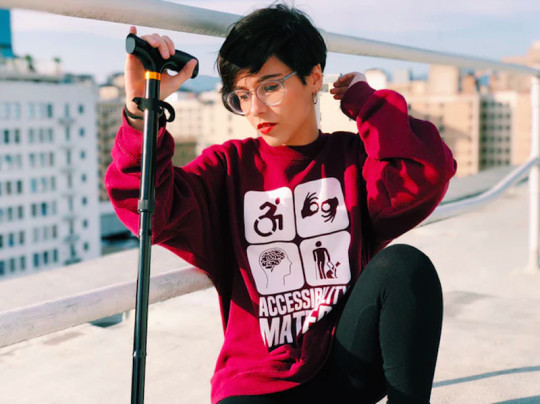
by Chaz Ebert and Matt Fagerholm
October 24, 2018 |
Print Page Tweet
Thumbnails is a roundup of brief excerpts to introduce you to articles from other websites that we found interesting and exciting. We provide links to the original sources for you to read in their entirety. This special edition of Thumbnails celebrates National Disability Employment Awareness Month, which runs through the entirety of October. Our contributor Scott Jordan Harris gave us the following article recommendations, and they provide a vital array of perspectives on the need for inclusivity in media.—Chaz Ebert
Advertisement
1.
“Growing Up, I Only Saw Half of Myself Represented On TV—That Needs to Change Now“: A personal essay from Bustle‘s Andrea Lausell about representations of Latinx people with disabilities. See also: Melissa Hung’s Huffington Post piece on “the most damaging way movies portray people with disabilities” and an article by prominent activist Vilissa Thompson on her Ramp Your Voice blog about portrayals of disability in the Black community.
“As I’ve grown into my adult years, it has made me happy to see Latinx-centered media begin to share stories of other marginalized non-disabled groups in the Latinx community (LGBTQ+, Afro-Latinx, Indigenous-Latinx). Representation is slowly improving with how these identities are viewed with TV shows like ‘One Day at a Time’ having a teenager like Elena Alvarez come out as queer and work through the emotions while seeking acceptance from her Cuban family. ‘Jane the Virgin’ highlights characters of color tackling the topic of immigration, all while making a political statement about our government and its treatment of people seeking a better life. Although these strides are giving us a diverse representation of Latinx culture and are being received fairly well by the community for being marathon-worthy, if Disabled Latinx were to be included in the narrative, would the public receive it as well? I’ve noticed that non-Latinx communities are just starting to embrace disabled narratives on their TV screens. Often, disabled representation in Hollywood, like in the novel-turned-film ‘Me Before You’ starring Emilia Clarke and Sam Claflin, portrays the harmful stereotype of disability being a burden. However, shows like ABC’s sitcom ‘Speechless’ have been a game changers for showing a disabled lead character happy with their life. But that’s just starting to happen now. Growing up, I learned to be ashamed of who I am because there were so few positive disabled Latinx representations on TV. Hearing from my Latinx community that disabled Latinx don’t exist — or that there’s ‘no need’ for us to be shown — told me that my place as a Disabled Latina within Latinidad wasn’t welcomed.”
2.
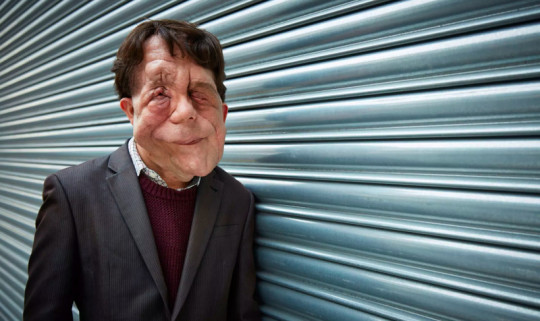
“Why are disabled actors ignored when it comes to roles like the Elephant Man?“: Asks The Guardian‘s Frances Ryan. See also: Ryan’s piece on the controversy regarding Netflix’s “Afflicted” series and Julie Rehmeyer’s Los Angeles Times essay on how Netflix is “televising prejudice against the chronically ill.”
“The BBC has been widely criticised over its decision to cast a non-disabled person in its remake of ‘The Elephant Man.’ The role of Joseph Merrick – who had severe physical deformities – will be played by the Stranger Things actor Charlie Heaton. Notably, actor Adam Pearson – who has neurofibromatosis type 1, a condition which was once thought to affect Merrick – has said he wasn’t even given the opportunity to audition. As Pearson told LBC, it’s part of a culture of exclusion for disabled actors. ‘It’s a systemic problem, not only in the BBC but industry-wide.’ From Dustin Hoffman in Rain Man to Eddie Redmayne in ‘The Theory of Everything,’ it’s routine for non-disabled actors to play disabled characters, often gaining critical acclaim in the process. At best, it takes work and exposure from talented disabled actors and further adds to an arts and culture that pushes disability representation – much like race, sex and class – to the sidelines. At worst, it sees non-disabled actors mimic the characteristics of a minority group without any involvement from the community it depicts.”
3.
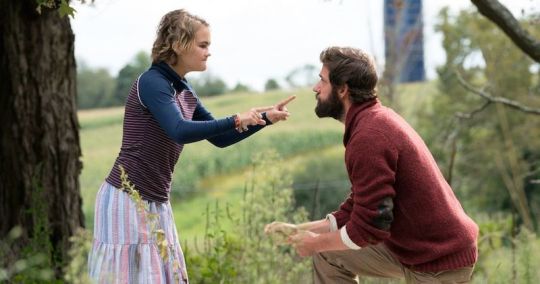
“‘A Quiet Place’ proves there’s no excuse for using non-disabled actors to play disabled characters“: According to The Independent‘s James Moore. See also: Variety‘s Joe Otterson reports that Maysoon Zayid, who has cerebral palsy, will write and star in “an autobiographical comedy series in development at ABC,” while CNN‘s Wayne Drash analyzes the outrage over the portrayal of epilepsy on Netflix’s “Seizure Boy.”
“The movie is set in a post-apocalyptic world haunted by blind monsters that zero in on sound with the aid of supersensitive hearing. Silence is thus a matter of survival. Because her family uses American Sign Language (ASL) they have an advantage: they can talk to each other in a world where speaking can get you killed. The script could have fallen down at this point by having Simmonds perform a functional role without much else to do other than move the plot along for the other actors, including A-lister Emily Blunt, to shine. But it has more ambition than that. Simmonds’ Regan Abbott is a fully formed character; a stroppy teen, chafing against her parents’ overprotectiveness and haunted by what she sees as her role in her little brother’s death. It’s not just her deafness that is central to the plot: she is. She’s neither an afterthought, nor is she an inspiration, which is another trap films involving disability fall into. She’s a person. She’s also the best thing about a film that is full of good things. Director John Krasinski, who pushed to cast her, has further revealed that she changed one of the signed parts of the scripts in an important way that makes it better. In fact she elevates the whole project. As Kamran Mallick, the chief executive of Disability Rights UK, says, she brings ‘an extra dimension to the role which a hearing actor would not have been able to do.’”
Advertisement
4.

“Toppling Structures of Inequality in the Documentary Field“: A great article published at IDA by Nicole Opper.
“New Day Films, a distribution co-op created by and for independent documentary filmmakers in 1971, has recently been grappling with what it means to be truly representative of the broad spectrum of filmmakers that exists, including filmmakers of color, working-class filmmakers, trans and gender non-binary filmmakers and those with disabilities—groups that have historically been underrepresented or poorly portrayed in the industry. At our Annual Meeting in upstate New York this past June, a panel was convened to discuss the findings of an Equity and Representation task force, and to open up the conversation to all member-owners of the co-op. ‘Very often in the documentary space, I’m the only person of color,’ remarked Michael Premo. Premo is the director of ‘Water Warriors,’ the story of a community’s successful fight to protect their water from the oil and natural gas industry. ‘This is also sort of dually equated with poverty, which is equally as racist as being the token black guy.’ Cheryl Green, the director of ‘Who Am I To Stop It’—a documentary about individuals with traumatic brain injuries—shared her perspective as a filmmaker with acquired disabilities herself: ‘There is no one disability community. What is a film about disability? What is a person with a disability? We’re not a monolith. There’s not one way to talk about it; there’s not one way to present it. The main way disability is represented is non-disabled people parachuting in and filming a medical story. Usually it’s one that starts off as ‘That’s gross or scary or painful! Phew! They got better.’”
5.
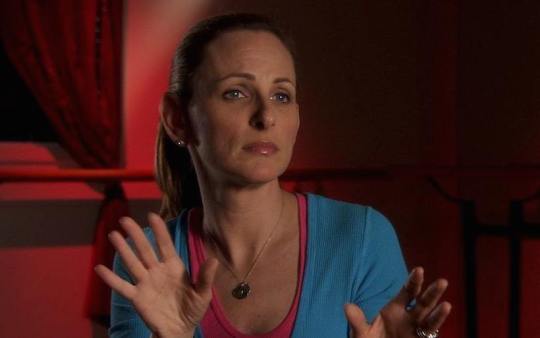
“CinemAbility: The Art of Inclusion“: Scott Jordan Harris recommends Jenni Gold’s documentary in his RogerEbert.com review.
“‘CinemAbility’ is the most entertaining and comprehensive history of disability in American film and television ever made. In that sense it is the onscreen equivalent of Matthew F. Norden’s classic book Cinema Of Isolation: A History Of Physical Disability In The Movies, and Norden is prominent in the film’s opening scenes, explaining the early and generally disheartening history of Hollywood’s ideas about disability. Due prominence is given to Lon Chaney, an able-bodied actor notorious in the disabled community for making a career out of grotesque and exploitative parodies of disability. He often did so in partnership with director Tod Browning, who in 1932 made ‘Freaks’ with a cast of disabled actors. Norden uses ‘Freaks’ to make an important point about audience attitudes to disability then that is still relevant now: ‘Audiences couldn’t handle [‘Freaks’]. People supposedly went screaming down the aisles because what they were seeing on the screen were not able-bodied actors wearing tricky makeup … They were seeing authentic disabled people.’ But ‘CinemaAbility’ never feels like a lecture. It is structured like a conversation, with contributions from an array of industry heavyweights, including Marlee Matlin, Ben Affleck, Geena Davis, William H. Macy, Ben Lewin, Peter Bogdanovich and R.J. Mitte.”
Image of the Day
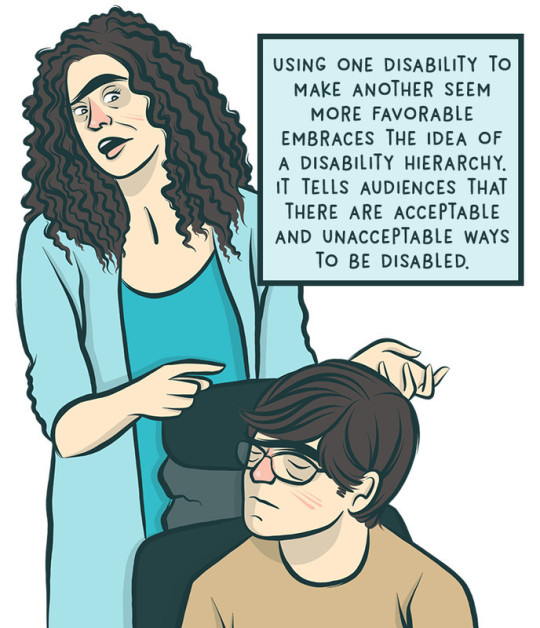
TV Guide‘s Alyssa Andrews explains “how TV is still failing people with disabilities,” in graphic novel form.
Video of the Day
[embedded content]
The official trailer for Jenni Gold’s documentary, “CinemAbility: The Art of Inclusion,” reviewed above by Scott Jordan Harris.
Previous Article: Thumbnails 9/28/18
Please enable JavaScript to view the comments powered by Disqus.
comments powered by
Source: https://bloghyped.com/thumbnails-special-edition-national-disability-employment-awareness-month/
0 notes
Text
Thumbnails Special Edition: National Disability Employment Awareness Month
Thumbnails is a roundup of brief excerpts to introduce you to articles from other websites that we found interesting and exciting. We provide links to the original sources for you to read in their entirety. This special edition of Thumbnails celebrates National Disability Employment Awareness Month, which runs through the entirety of October. Our contributor Scott Jordan Harris gave us the following article recommendations, and they provide a vital array of perspectives on the need for inclusivity in media.—Chaz Ebert
1.
"Growing Up, I Only Saw Half of Myself Represented On TV—That Needs to Change Now": A personal essay from Bustle's Andrea Lausell about representations of Latinx people with disabilities. See also: Melissa Hung's Huffington Post piece on "the most damaging way movies portray people with disabilities" and an article by prominent activist Vilissa Thompson on her Ramp Your Voice blog about portrayals of disability in the Black community.
“As I’ve grown into my adult years, it has made me happy to see Latinx-centered media begin to share stories of other marginalized non-disabled groups in the Latinx community (LGBTQ+, Afro-Latinx, Indigenous-Latinx). Representation is slowly improving with how these identities are viewed with TV shows like ‘One Day at a Time’ having a teenager like Elena Alvarez come out as queer and work through the emotions while seeking acceptance from her Cuban family. ‘Jane the Virgin’ highlights characters of color tackling the topic of immigration, all while making a political statement about our government and its treatment of people seeking a better life. Although these strides are giving us a diverse representation of Latinx culture and are being received fairly well by the community for being marathon-worthy, if Disabled Latinx were to be included in the narrative, would the public receive it as well? I’ve noticed that non-Latinx communities are just starting to embrace disabled narratives on their TV screens. Often, disabled representation in Hollywood, like in the novel-turned-film ‘Me Before You’ starring Emilia Clarke and Sam Claflin, portrays the harmful stereotype of disability being a burden. However, shows like ABC’s sitcom ‘Speechless’ have been a game changers for showing a disabled lead character happy with their life. But that’s just starting to happen now. Growing up, I learned to be ashamed of who I am because there were so few positive disabled Latinx representations on TV. Hearing from my Latinx community that disabled Latinx don’t exist — or that there’s ‘no need’ for us to be shown — told me that my place as a Disabled Latina within Latinidad wasn’t welcomed.”
2.
"Why are disabled actors ignored when it comes to roles like the Elephant Man?": Asks The Guardian's Frances Ryan. See also: Ryan's piece on the controversy regarding Netflix's "Afflicted" series and Julie Rehmeyer's Los Angeles Times essay on how Netflix is "televising prejudice against the chronically ill."
“The BBC has been widely criticised over its decision to cast a non-disabled person in its remake of ‘The Elephant Man.’ The role of Joseph Merrick – who had severe physical deformities – will be played by the Stranger Things actor Charlie Heaton. Notably, actor Adam Pearson – who has neurofibromatosis type 1, a condition which was once thought to affect Merrick – has said he wasn’t even given the opportunity to audition. As Pearson told LBC, it’s part of a culture of exclusion for disabled actors. ‘It’s a systemic problem, not only in the BBC but industry-wide.’ From Dustin Hoffman in Rain Man to Eddie Redmayne in ‘The Theory of Everything,’ it’s routine for non-disabled actors to play disabled characters, often gaining critical acclaim in the process. At best, it takes work and exposure from talented disabled actors and further adds to an arts and culture that pushes disability representation – much like race, sex and class – to the sidelines. At worst, it sees non-disabled actors mimic the characteristics of a minority group without any involvement from the community it depicts.”
3.
"'A Quiet Place' proves there's no excuse for using non-disabled actors to play disabled characters": According to The Independent's James Moore. See also: Variety's Joe Otterson reports that Maysoon Zayid, who has cerebral palsy, will write and star in "an autobiographical comedy series in development at ABC," while CNN's Wayne Drash analyzes the outrage over the portrayal of epilepsy on Netflix's "Seizure Boy."
“The movie is set in a post-apocalyptic world haunted by blind monsters that zero in on sound with the aid of supersensitive hearing. Silence is thus a matter of survival. Because her family uses American Sign Language (ASL) they have an advantage: they can talk to each other in a world where speaking can get you killed. The script could have fallen down at this point by having Simmonds perform a functional role without much else to do other than move the plot along for the other actors, including A-lister Emily Blunt, to shine. But it has more ambition than that. Simmonds’ Regan Abbott is a fully formed character; a stroppy teen, chafing against her parents’ overprotectiveness and haunted by what she sees as her role in her little brother’s death. It’s not just her deafness that is central to the plot: she is. She’s neither an afterthought, nor is she an inspiration, which is another trap films involving disability fall into. She’s a person. She’s also the best thing about a film that is full of good things. Director John Krasinski, who pushed to cast her, has further revealed that she changed one of the signed parts of the scripts in an important way that makes it better. In fact she elevates the whole project. As Kamran Mallick, the chief executive of Disability Rights UK, says, she brings ‘an extra dimension to the role which a hearing actor would not have been able to do.’”
4.
"Toppling Structures of Inequality in the Documentary Field": A great article published at IDA by Nicole Opper.
“New Day Films, a distribution co-op created by and for independent documentary filmmakers in 1971, has recently been grappling with what it means to be truly representative of the broad spectrum of filmmakers that exists, including filmmakers of color, working-class filmmakers, trans and gender non-binary filmmakers and those with disabilities—groups that have historically been underrepresented or poorly portrayed in the industry. At our Annual Meeting in upstate New York this past June, a panel was convened to discuss the findings of an Equity and Representation task force, and to open up the conversation to all member-owners of the co-op. ‘Very often in the documentary space, I'm the only person of color,’ remarked Michael Premo. Premo is the director of ‘Water Warriors,’ the story of a community's successful fight to protect their water from the oil and natural gas industry. ‘This is also sort of dually equated with poverty, which is equally as racist as being the token black guy.’ Cheryl Green, the director of ‘Who Am I To Stop It’—a documentary about individuals with traumatic brain injuries—shared her perspective as a filmmaker with acquired disabilities herself: ‘There is no one disability community. What is a film about disability? What is a person with a disability? We're not a monolith. There's not one way to talk about it; there's not one way to present it. The main way disability is represented is non-disabled people parachuting in and filming a medical story. Usually it’s one that starts off as ‘That's gross or scary or painful! Phew! They got better.’”
5.
"CinemAbility: The Art of Inclusion": Scott Jordan Harris recommends Jenni Gold's documentary in his RogerEbert.com review.
“‘CinemAbility’ is the most entertaining and comprehensive history of disability in American film and television ever made. In that sense it is the onscreen equivalent of Matthew F. Norden's classic book Cinema Of Isolation: A History Of Physical Disability In The Movies, and Norden is prominent in the film's opening scenes, explaining the early and generally disheartening history of Hollywood's ideas about disability. Due prominence is given to Lon Chaney, an able-bodied actor notorious in the disabled community for making a career out of grotesque and exploitative parodies of disability. He often did so in partnership with director Tod Browning, who in 1932 made ‘Freaks’ with a cast of disabled actors. Norden uses ‘Freaks’ to make an important point about audience attitudes to disability then that is still relevant now: ‘Audiences couldn't handle [‘Freaks’]. People supposedly went screaming down the aisles because what they were seeing on the screen were not able-bodied actors wearing tricky makeup ... They were seeing authentic disabled people.’ But ‘CinemaAbility’ never feels like a lecture. It is structured like a conversation, with contributions from an array of industry heavyweights, including Marlee Matlin, Ben Affleck, Geena Davis, William H. Macy, Ben Lewin, Peter Bogdanovich and R.J. Mitte.”
Image of the Day
TV Guide's Alyssa Andrews explains "how TV is still failing people with disabilities," in graphic novel form.
Video of the Day
youtube
The official trailer for Jenni Gold's documentary, "CinemAbility: The Art of Inclusion," reviewed above by Scott Jordan Harris.
from All Content https://ift.tt/2OOlC4P
0 notes